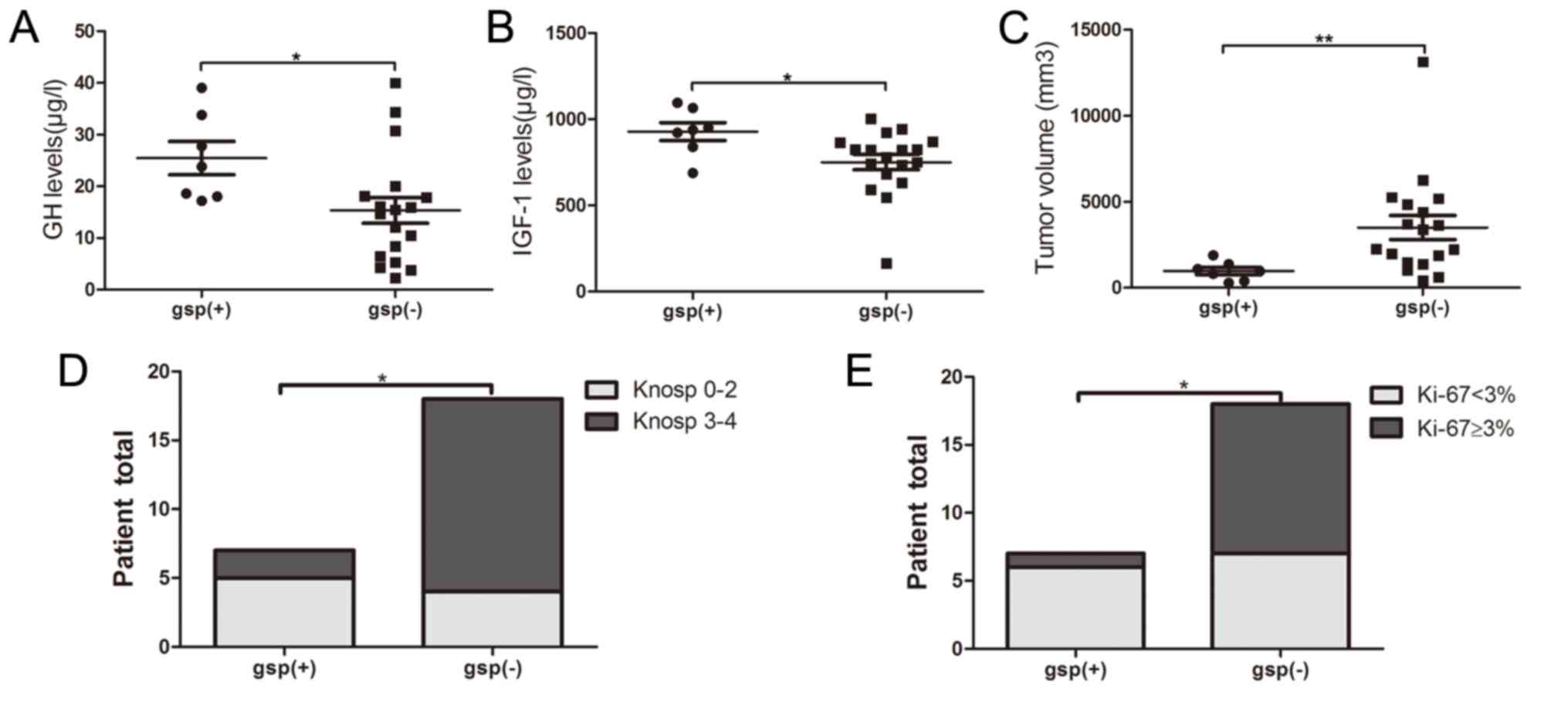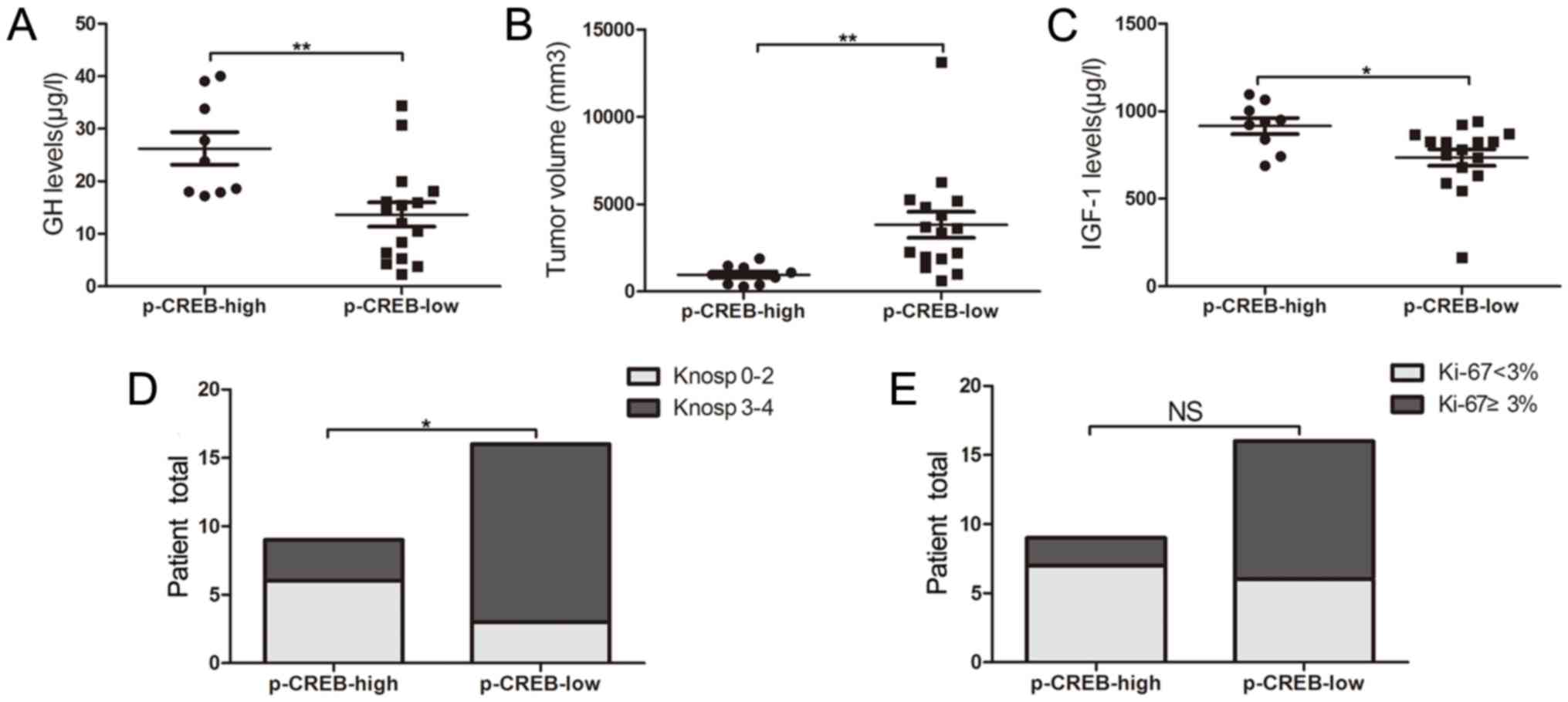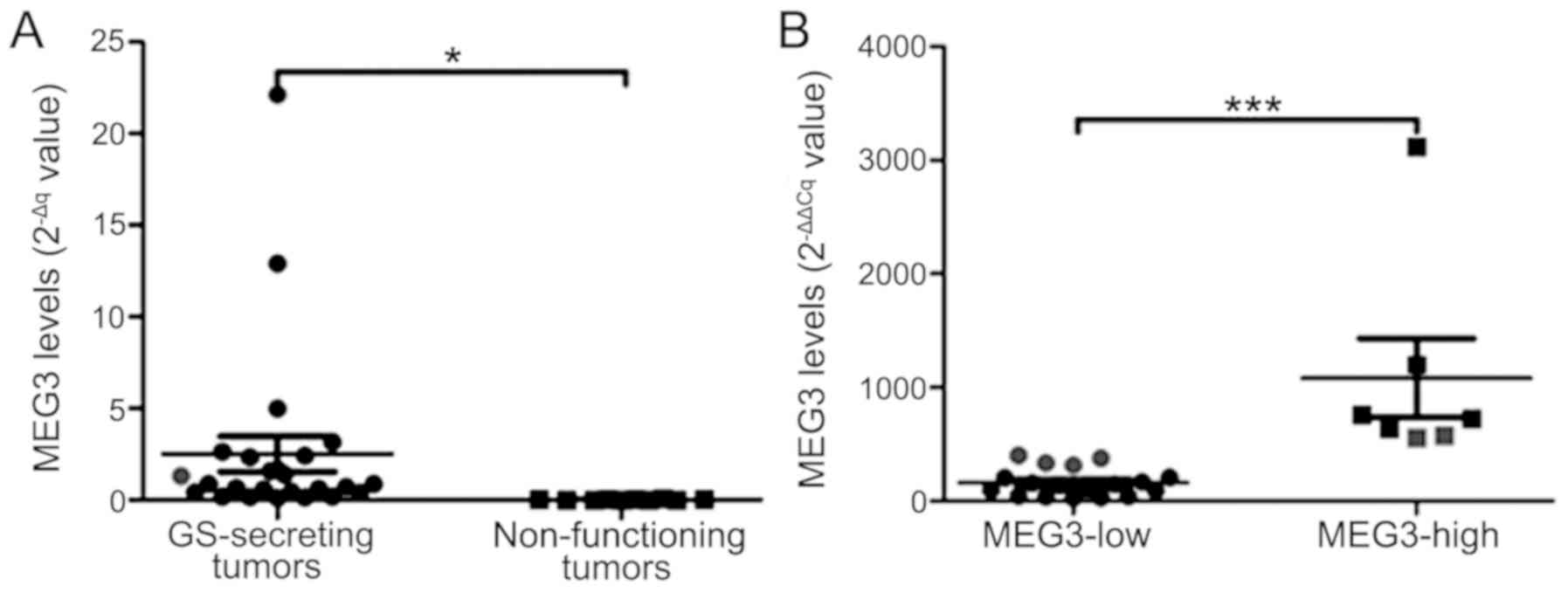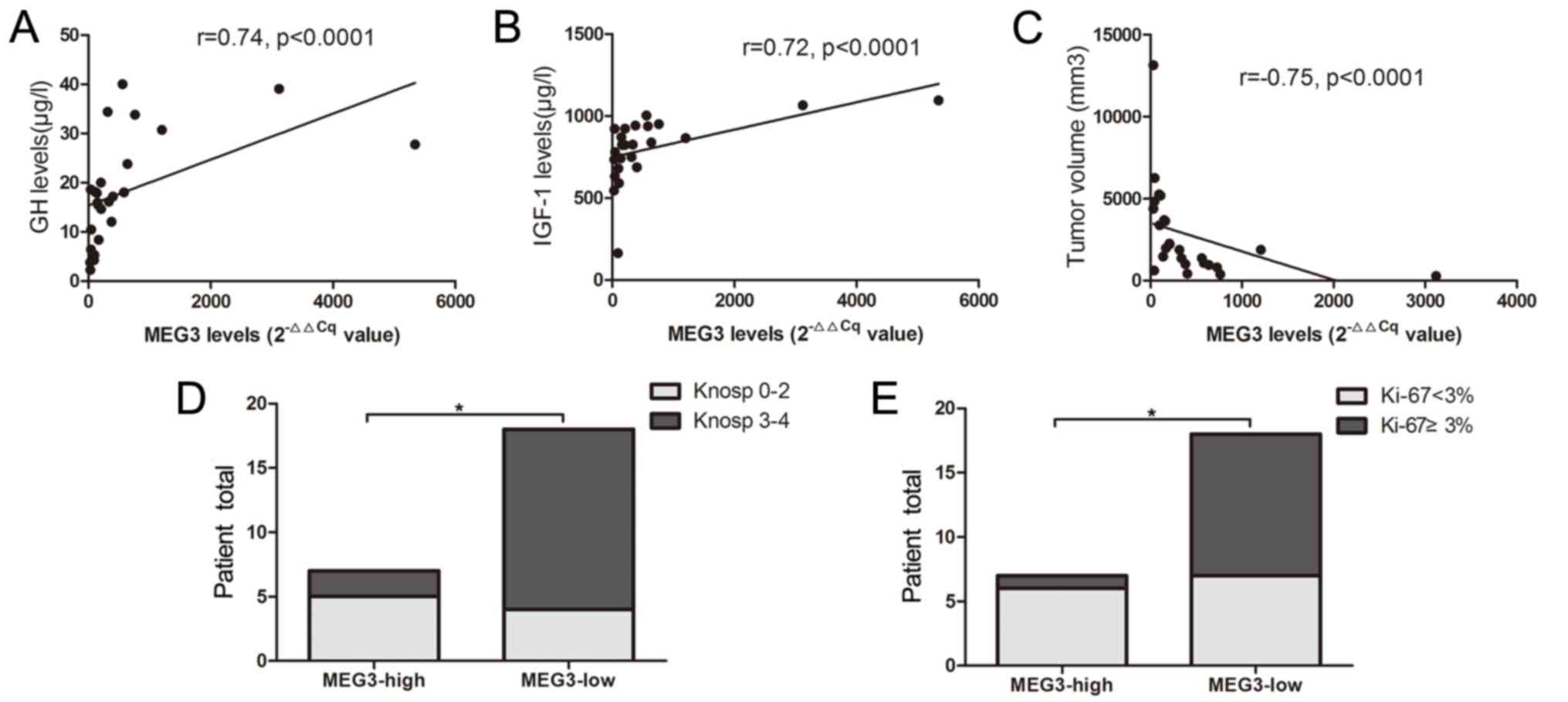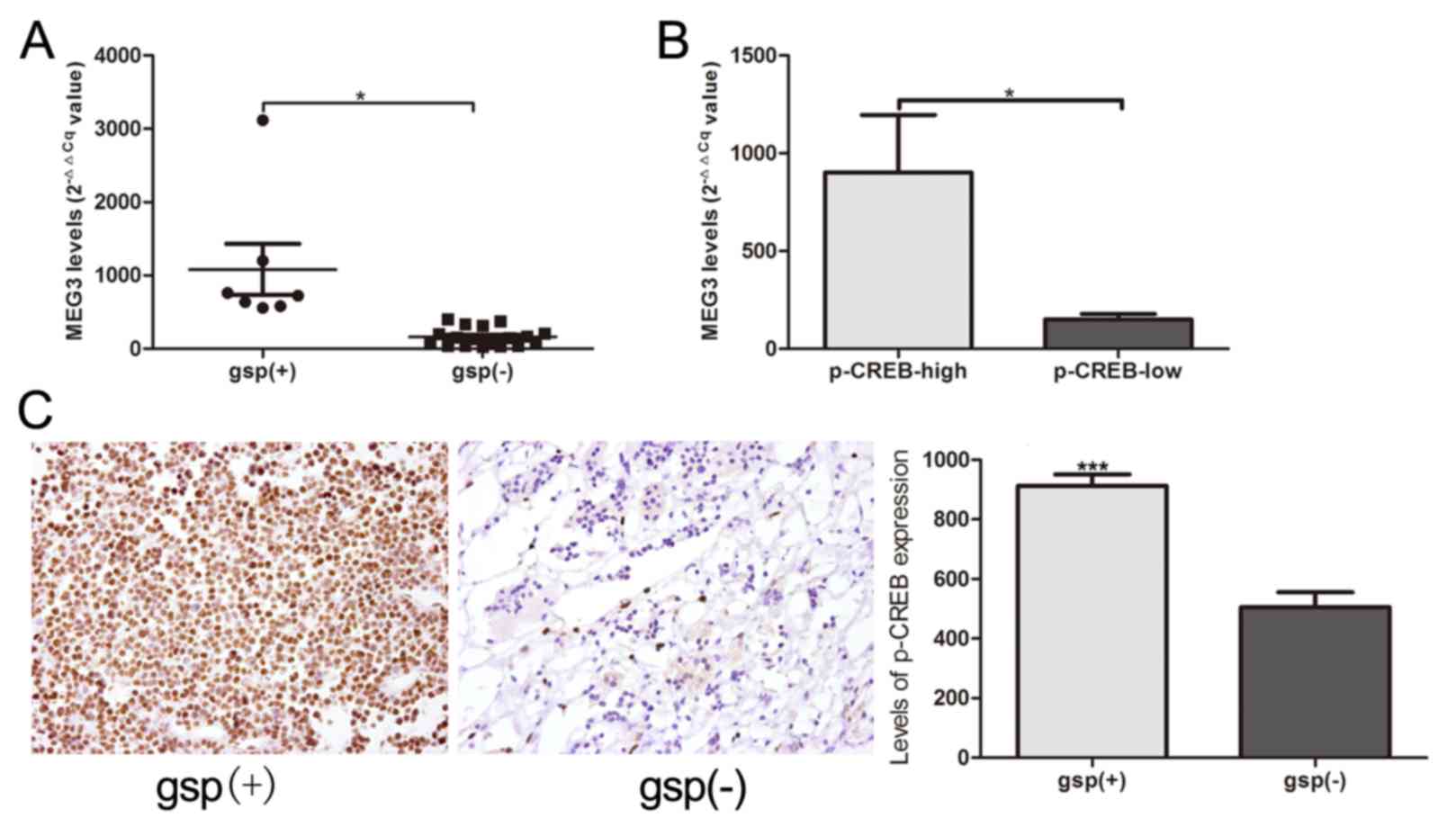|
1
|
Freda PU, Chung WK, Matsuoka N, Walsh JE,
Kanibir MN, Kleinman G, Wang Y, Bruce JN and Post KD: Analysis of
GNAS mutations in 60 growth hormone secreting pituitary tumors:
Correlation with clinical and pathological characteristics and
surgical outcome based on highly sensitive GH and IGF-I criteria
for remission. Pituitary. 10:275–282. 2007. View Article : Google Scholar : PubMed/NCBI
|
|
2
|
Yasufuku-Takano J, Takano K, Morita K,
Takakura K, Teramoto A and Fujita T: Does the prevalence of gsp
mutations in GH-secreting pituitary adenomas differ geographically
or racially? Prevalence of gsp mutations in Japanese patients
revisited. Clin Endocrinol (Oxf). 64:91–96. 2006. View Article : Google Scholar : PubMed/NCBI
|
|
3
|
Park C, Yang I, Woo J, Kim S, Kim J, Kim
Y, Sohn S, Kim E, Lee M, Park H, Jung J and Park S: Somatostatin
(SRIF) receptor subtype 2 and 5 gene expression in growth
hormone-secreting pituitary adenomas: The relationship with
endogenous srif activity and response to octreotide. Endocr J.
51:227–236. 2004. View Article : Google Scholar : PubMed/NCBI
|
|
4
|
Buchfelder M, Fahlbusch R, Merz T,
Symowski H and Adams EF: Clinical correlates in acromegalic
patients with pituitary tumors expressing GSP oncogenes. Pituitary.
1:181–185. 1999. View Article : Google Scholar : PubMed/NCBI
|
|
5
|
Ballare E, Mantovani S, Lania A, Di Blasio
AM, Vallar L and Spada A: Activating mutations of the Gs alpha gene
are associated with low levels of Gs alpha protein in growth
hormone-secreting tumors. J Clin Endocrinol Metab. 83:4386–4390.
1998. View Article : Google Scholar : PubMed/NCBI
|
|
6
|
Yang I, Park S, Ryu M, Woo J, Kim S, Kim
J, Kim Y and Choi Y: Characteristics of gsp-positive growth
hormone-secreting pituitary tumors in Korean acromegalic patients.
Eur J Endocrinol. 134:720–726. 1996. View Article : Google Scholar : PubMed/NCBI
|
|
7
|
Hosoi E, Yokogoshi Y, Hosoi E, Horie H,
Sano T, Yamada S and Saito S: Analysis of the Gs alpha gene in
growth hormone-secreting pituitary adenomas by the polymerase chain
reaction-direct sequencing method using paraffin-embedded tissues.
Acta Endocrinol (Copenh). 129:301–306. 1993. View Article : Google Scholar : PubMed/NCBI
|
|
8
|
Adams EF, Brockmeier S, Friedmann E, Roth
M, Buchfelder M and Fahlbusch R: Clinical and biochemical
characteristics of acromegalic patients harboring gsp-positive and
gsp-negative pituitary tumors. Neurosurgery. 33:198–203. 1993.
View Article : Google Scholar : PubMed/NCBI
|
|
9
|
Spada A, Arosio M, Bochicchio D, Bazzoni
N, Vallar L, Bassetti M and Faglia G: Clinical, biochemical, and
morphological correlates in patients bearing growth
hormone-secreting pituitary tumors with or without constitutively
active adenylyl cyclase. J Clin Endocrinol Metab. 71:1421–1426.
1990. View Article : Google Scholar : PubMed/NCBI
|
|
10
|
Spada A, Arosio M, Bassetti M, Vallar L,
Clementi E and Bazzoni N: Mutations in the alpha subunit of the
stimulatory regulatory protein of adenylyl cyclase (Gs) in human
GH-secreting pituitary adenomas. Biochemical, clinical, and
morphological aspects. Pathol Res Pract. 187:567–570. 1991.
View Article : Google Scholar : PubMed/NCBI
|
|
11
|
Landis CA, Harsh G, Lyons J, Davis RL,
McCormick F and Bourne HR: Clinical characteristics of acromegalic
patients whose pituitary tumors contain mutant Gs protein. J Clin
Endocrinol Metab. 71:1416–1420. 1990. View Article : Google Scholar : PubMed/NCBI
|
|
12
|
Goto Y, Kinoshita M, Oshino S, Arita H,
Kitamura T, Otsuki M, Shimomura I, Yoshimine T and Saitoh Y: Gsp
mutation in acromegaly and its influence on TRH-induced paradoxical
GH response. Clin Endocrinol (Oxf). 80:714–719. 2014. View Article : Google Scholar : PubMed/NCBI
|
|
13
|
Fusco A, Zatelli MC, Bianchi A, Cimino V,
Tilaro L, Veltri F, Angelini F, Lauriola L, Vellone V, Doglietto F,
et al: Prognostic significance of the Ki-67 labeling index in
growth hormone-secreting pituitary adenomas. J Clin Endocrinol
Metab. 93:2746–2750. 2008. View Article : Google Scholar : PubMed/NCBI
|
|
14
|
Thapar K, Scheithauer BW, Kovacs K,
Pernicone PJ and Laws ER Jr: p53 expression in pituitary adenomas
and carcinomas: Correlation with invasiveness and tumor growth
fractions. Neurosurgery. 38:765–771. 1996. View Article : Google Scholar : PubMed/NCBI
|
|
15
|
Livak KJ and Schmittgen TD: Analysis of
relative gene expression data using real-time quantitative PCR and
the 2(-Delta Delta C(T)) method. Methods. 25:402–408. 2001.
View Article : Google Scholar : PubMed/NCBI
|
|
16
|
Ruopp MD, Perkins NJ, Whitcomb BW and
Schisterman EF: Youden Index and optimal cut-point estimated from
observations affected by a lower limit of detection. Biom J.
50:419–430. 2008. View Article : Google Scholar : PubMed/NCBI
|
|
17
|
Kim HJ, Kim MS, Park YJ, Kim SW, Park DJ,
Park KS, Kim SY, Cho BY, Lee HK, Jung HW, et al: Prevalence of Gs
alpha mutations in Korean patients with pituitary adenomas. J
Endocrinol. 168:221–226. 2001. View Article : Google Scholar : PubMed/NCBI
|
|
18
|
Metzler M, Luedecke DK, Saeger W, Grueters
A, Haberl H, Kiess W, Repp R, Rascher W and Doetsch J: Low
prevalence of Gs alpha mutations in śomatotroph adenomas of
children and adolescents. Cancer Genet Cytogenet. 166:146–151.
2006. View Article : Google Scholar : PubMed/NCBI
|
|
19
|
Efstathiadou ZA, Bargiota A, Chrisoulidou
A, Kanakis G, Papanastasiou L, Theodoropoulou A, Tigas SK,
Vassiliadi DA, Alevizaki M and Tsagarakis S: Impact of gsp
mutations in somatotroph pituitary adenomas on growth hormone
response to somatostatin analogs: A meta-analysis. Pituitary.
18:861–867. 2015. View Article : Google Scholar : PubMed/NCBI
|
|
20
|
Clementi E, Malgaretti N, Meldolesi J and
Taramelli R: A new constitutively activating mutation of the Gs
protein alpha subunit-gsp oncogene is found in human pituitary
tumours. Oncogene. 5:1059–1061. 1990.PubMed/NCBI
|
|
21
|
Landis CA, Masters SB, Spada A, Pace AM,
Bourne HR and Vallar L: GTPase inhibiting mutations activate the
alpha chain of Gs and stimulate adenylyl cyclase in human pituitary
tumours. Nature. 340:692–696. 1989. View
Article : Google Scholar : PubMed/NCBI
|
|
22
|
Billestrup N, Swanson LW and Vale W:
Growth hormone-releasing factor stimulates proliferation of
somatotrophs in vitro. Proc Natl Acad Sci USA. 83:6854–6857. 1986.
View Article : Google Scholar : PubMed/NCBI
|
|
23
|
Mantovani G, Bondioni S, Ferrero S, Gamba
B, Ferrante E, Peverelli E, Corbetta S, Locatelli M, Rampini P,
Beck-Peccoz P, et al: Effect of cyclic adenosine
3′,5′-monophosphate/protein kinase a pathway on markers of cell
proliferation in nonfunctioning pituitary adenomas. J Clin
Endocrinol Metab. 90:6721–6724. 2005. View Article : Google Scholar : PubMed/NCBI
|
|
24
|
Pertuit M, Barlier A, Enjalbert A and
Gérard C: Signalling pathway alterations in pituitary adenomas:
Involvement of Gsalpha, cAMP and mitogen-activated protein kinases.
J Neuroendocrinol. 21:869–877. 2009. View Article : Google Scholar : PubMed/NCBI
|
|
25
|
Yamamoto KK, Gonzalez GA, Menzel P, Rivier
J and Montminy MR: Characterization of a bipartite activator domain
in transcription factor CREB. Cell. 60:611–617. 1990. View Article : Google Scholar : PubMed/NCBI
|
|
26
|
Meyer TE, Waeber G, Lin J, Beckmann W and
Habener JF: The promoter of the gene encoding 3′,5′-cyclic
adenosine monophosphate (cAMP) response element binding protein
contains cAMP response elements: Evidence for positive
autoregulation of gene transcription. Endocrinology. 132:770–780.
1993. View Article : Google Scholar : PubMed/NCBI
|
|
27
|
Zhang X, Rice K, Wang Y, Chen W, Zhong Y,
Nakayama Y, Zhou Y and Klibanski A: Maternally expressed gene 3
(MEG3) noncoding ribonucleic acid: Isoform structure, expression,
and functions. Endocrinology. 151:939–947. 2010. View Article : Google Scholar : PubMed/NCBI
|
|
28
|
Zhao J, Zhang X, Zhou Y, Ansell PJ and
Klibanski A: Cyclic AMP stimulates MEG3 gene expression in cells
through a cAMP-response element (CRE) in the MEG3 proximal promoter
region. Int J Biochem Cell Biol. 38:1808–1820. 2006. View Article : Google Scholar : PubMed/NCBI
|
|
29
|
Zhang X, Zhou Y, Mehta KR, Danila DC,
Scolavino S, Johnson SR and Klibanski A: A pituitary-derived MEG3
isoform functions as a growth suppressor in tumor cells. J Clin
Endocrinol Metab. 88:5119–5126. 2003. View Article : Google Scholar : PubMed/NCBI
|
|
30
|
Frutos MG, Cacicedo L, Méndez CF, Vicent
D, González M and Sánchez-Franco F: Pituitary alterations involved
in the decline of growth hormone gene expression in the pituitary
of aging rats. J Gerontol A Biol Sci Med Sci. 62:585–597. 2007.
View Article : Google Scholar : PubMed/NCBI
|
|
31
|
Zhou Y, Zhong Y, Wang Y, Zhang X, Batista
DL, Gejman R, Ansell PJ, Zhao J, Weng C and Klibanski A: Activation
of p53 by MEG3 non-coding RNA. J Biol Chem. 282:24731–24742. 2007.
View Article : Google Scholar : PubMed/NCBI
|
|
32
|
Jia LF, Wei SB, Gan YH, Guo Y, Gong K,
Mitchelson K, Cheng J and Yu GY: Expression, regulation and roles
of miR-26a and MEG3 in tongue squamous cell carcinoma. Int J
Cancer. 135:2282–2293. 2014. View Article : Google Scholar : PubMed/NCBI
|
|
33
|
Lu KH, Li W, Liu XH, Sun M, Zhang ML, Wu
WQ, Xie WP and Hou YY: Long non-coding RNA MEG3 inhibits NSCLC
cells proliferation and induces apoptosis by affecting p53
expression. BMC Cancer. 13:4612013. View Article : Google Scholar : PubMed/NCBI
|
|
34
|
Wang P, Ren Z and Sun P: Overexpression of
the long non-coding RNA MEG3 impairs in vitro glioma cell
proliferation. J Cell Biochem. 113:1868–1874. 2012. View Article : Google Scholar : PubMed/NCBI
|
|
35
|
Chunharojrith P, Nakayama Y, Jiang X, Kery
RE, Ma J, De La Hoz Ulloa CS, Zhang X, Zhou Y and Klibanski A:
Tumor suppression by MEG3 lncRNA in a human pituitary tumor derived
cell line. Mol Cell Endocrinol. 416:27–35. 2015. View Article : Google Scholar : PubMed/NCBI
|















